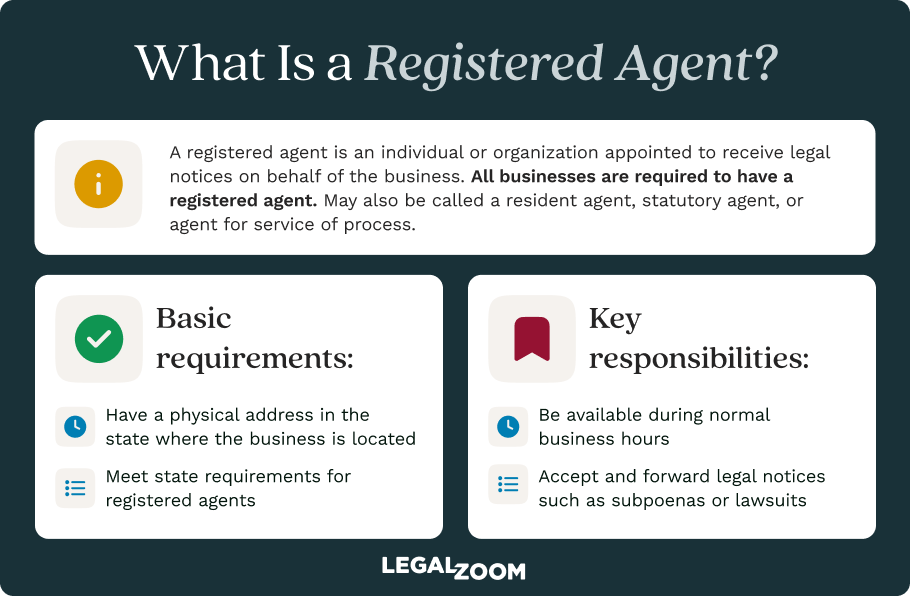These days, North Carolina is just as known for its picturesque landscape as it is for its breweries, art galleries, and live music. From the Research Triangle to the Asheville arts scene, industries like technology, agriculture, and manufacturing are thriving.
If you plan to start a business here or your out-of-state business plans to operate here, you need to know how to designate a North Carolina registered agent with the Secretary of State.
What is a North Carolina registered agent and what do they do?
An NC registered agent is a person or entity that you designate to receive official legal documents on behalf of your business, such as lawsuit papers, subpoenas, and other legal notices. They might also receive other official papers on behalf of the business, such as business license renewal and tax notices from state agencies like the North Carolina Department of Revenue.
The registered agent will notify the business owner of any papers received and promptly forward them to the business entity if necessary. North Carolina law requires most businesses to have a registered agent with a physical address in the state, known as a registered office address.
Primary responsibilities of a North Carolina registered agent
- Accept service of process. The main purpose of a registered agent is to accept service of process, which is a notification that your business is being sued.
- Receive official state correspondence. This includes annual report reminders from the Secretary of State, tax forms from the Department of Revenue, and business license renewal reminders.
- Forward documents promptly. Agents need to ensure that all legal and official documents reach the business owner in a timely manner.
- Maintain availability. They must be present at the registered office during regular business hours to accept documents (typically Monday through Friday, 9 a.m. to 5 p.m.).
North Carolina registered agent requirements
Registered agents in North Carolina need to meet one of the following requirements:
- Be an individual who resides in North Carolina
- Be a corporation or limited liability company that is active on the Secretary of State’s records and is authorized to do business in the state
All registered agents must:
- Maintain a physical address in North Carolina that will serve as the “registered office”
- Consents to serve as your registered agent
A registered agent can be an employee of your company, and you can even be your own registered agent— but remember, you must maintain regular office hours at a physical location, and that address becomes part of public record. If you operate out of your home, this means your home address. Plus, if you’re not available to receive documents, you may miss out on the opportunity to defend yourself in court.
LegalZoom’s registered offices in Charlotte and Raleigh meet all NC requirements and also offer unlimited cloud storage with alerts when important documents arrive.

How to appoint a registered agent in North Carolina
You can officially appoint a registered agent when you file formation documents with the NC Secretary of State (SOS). Which form you file depends on your business structure.
- For an LLC. File articles of organization (Form L-01) and include your registered agent’s name and registered office address. Pay the $125 filing fee and wait for confirmation.
- For a corporation. Fill out the articles of incorporation (Form B-01) with your registered agent’s information and pay the filing fee, which is also $125.
- For a nonprofit. Submit articles of incorporation for a nonprofit corporation (Form N-01). Fill in your agent’s name and registered office address and pay the $60 filing fee.
- For a foreign entity. Businesses that’re already registered in another state can designate their registered agent in their application for a certificate of authority, which is based on their entity type. Both foreign LLCs and corporations pay $250, while foreign nonprofits pay $125 to file.
How to change your North Carolina registered agent
North Carolina makes it relatively easy to change your registered agent. All businesses can file a Statement of Change of Registered Office and/or Registered Agent (Form BE-06) and pay a $5 filing fee. Make sure to also update your own records and notify any authority that may need to communicate with you through your new agent.
If you select LegalZoom as your registered agent, we will file the paperwork for you and cover the filing fee at no extra cost.
Why should you hire a North Carolina registered agent service?
While you or another employee can serve as your company’s registered agent, professional services offer several benefits that can outweigh the added cost. This is especially true for business owners that travel frequently or don’t maintain regular business hours.
- Legal compliance. A professional registered agent will meet state requirements, ensuring your business remains in good standing and compliant with the law.
- Risk mitigation. Forgetting to respond to a lawsuit, missing important business documents, or not filing by your annual report deadlines can lead to serious consequences. Registered agents receive these notices and alert you in a timely manner.
- Professionalism. Using your home address as your registered office can feel unprofessional to investors, customers, or business partners. A professional agent provides a dedicated address that reflects your company’s credibility.
- Flexibility. If you run a business with a flexible or mobile setup, like an event planning company that travels across North Carolina, or even if you go on vacation often, having a registered agent means you won’t miss key documents.
- Privacy. Using a registered agent can help protect you from unwanted visitors or embarrassing situations. For example, if your business is sued, the papers will be delivered to your agent instead of your home or storefront.
- Access to extra services. Beyond compliance, professional agents sometimes offer services like mail forwarding, virtual mailboxes, and digital document storage, helping you stay organized and efficient.
Why choose LegalZoom as your North Carolina registered agent?
In our 20+ years of experience helping people start their businesses, we’ve seen it all when it comes to ever-evolving compliance requirements. As your registered agent, we stay on top of changes in state requirements and send alerts when we receive important correspondence so that you’ll never miss a beat.
Here are some of the perks of using LegalZoom as your registered agent:
- Added privacy. Critical legal notices come to our address instead of your home or workplace.
- Time-sensitive alerts. You’ll receive alerts for important and time-sensitive mail.
- Guaranteed availability. Our NC office is open during normal business hours to receive official mail and meet legal requirements.
- Digital storage. Our service includes secure cloud storage so you can access critical business documents anytime, from anywhere.
- Junk mail filtering. You only get the information that matters, saving you time and effort.
- Seamless transition services. If you want to make us your new registered agent, we'll pay the fees and take care of that paperwork at no cost to you.
FAQs about North Carolina registered agents
Can I be my own registered agent in NC?
Yes, North Carolina allows business owners to act as their own registered agents, but there are challenges to consider. You must have a physical address in North Carolina, which can’t be a P.O. box, and you need to be available during normal business hours to accept documents. Many business owners find that hiring a professional agent is a more practical solution.
How much does a registered agent cost in NC?
That depends on who you choose to serve as your agent. You can be your own agent for no additional cost or hire an outside service for varying prices. Basic registered agent services typically range from $100 to $300 per year. Some providers also offer additional services, such as compliance monitoring or digital mail forwarding, which may cost extra. LegalZoom’s service is $249/year.
What happens if I don't maintain a registered agent?
If a business entity fails to designate or maintain a registered agent, the NC Secretary of State will receive service of process on its behalf. The SOS charges $10 for each document that they receive on behalf of the business. This could also eventually lead to dissolution (canceling its status as a legal entity in the state).
How do I search for a company's registered agent on the NC SOS site?
You can search for a company's registered agent information through the North Carolina Secretary of State's online business database.
- Visit the NC Secretary of State website
- Navigate to the "Business Registration" section
- Scroll down to use the business entity search tool
- Enter the company name or entity number
- View the business details, which will include registered agent information
This information is public record and includes the registered agent's name and registered office address.
Can a registered agent use a P.O. box in NC?
No, a registered agent can’t use a P.O. box as the registered office address in North Carolina. The registered office must have a physical street address where the agent is available during regular business hours. However, you may list a separate mailing address (including a P.O. box) in addition to the required physical street address for the registered office.
What forms do I need to change my registered agent in North Carolina?
You need a statement of change of registered agent and/or registered office, which is available on the Secretary of State’s website.
How long does it take to process a registered agent change in NC?
The North Carolina Secretary of State typically processes registered agent changes within several business days for online filings, and 15 to 20 business days for paper submissions. Although processing time may vary, expedited processing may be available for an additional fee. You can track the status of your filing through the Secretary of State's online system.
Do I need to notify anyone else when I change my registered agent?
Yes, you should notify any parties that send communication to your business through your registered agent, such as the following:
- Your former registered agent (to arrange document transfers)
- Banks and financial institutions
- Insurance companies
- Business licensing authorities
- Key vendors and business partners
- Anyone who may need to serve legal documents on your business
Can an out-of-state company serve as my registered agent in NC?
An out-of-state company can serve as your registered agent in North Carolina as long as they’re authorized to conduct business in North Carolina and have a physical office location in the state.
Carolyn Albee and Edward Hartman contributed to this article.


